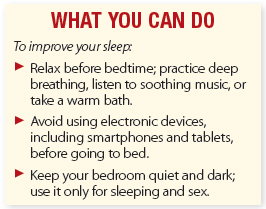Getting Enough Quality Sleep Is Essential for Your Brain
If you think dreaming is the main activity going on in your brain while you sleep, think again. Your brain performs hundreds, perhaps thousands, of tasks every night, many of which are related to sifting through and organizing information and storing memories.
“We now know that the brain is actively processing while we are sleeping as well as while we’re awake,” says Ana Krieger, MD, medical director of the Weill Cornell Center for Sleep Medicine. “Part of the processing is involved in making, sorting, and storing memories.”
Sleeping Body, Busy Brain
Scientists don’t yet have a complete understanding of how the brain forms and stores memories. It is known that short-term memories are turned into long-term memories in an area of the brain called the hippocampus. While you sleep, the hippocampus communicates with and transfers memories to the brain’s cortex—and researchers have discovered that one stage of sleep is most conducive to this process.
It appears that slow-wave sleep, also called “deep sleep,” is the stage during which memories are consolidated. Researchers believe that the brain is least affected by external sensory input during this stage of sleep. In other words, because the brain isn’t busy doing other things during slow-wave sleep, its ability to preserve memories is at its peak.
Some researchers are now investigating ways to increase the amount of slow-wave sleep with the hope that doing so may have a positive effect on memory function.
Memory Selection
One question researchers are seeking to answer is how the brain determines what information to preserve and what to discard, since it is exposed to far more data than it can hold. In general, the nighttime brain does a good job of prioritizing the information we take in each day—but there are those times when we have clear memories of seemingly unimportant occurrences but have forgotten events that have had a larger impact on our lives.
Sleep Needs Vary
There is no set amount of sleep that is best for everyone, so it’s up to you to determine your ideal sleep duration and make sure you get it. High-quality sleep is sleep that is seldom interrupted, which allows the brain to move from one sleep stage to the next until a sleep cycle is completed.
Sleep Disrupters
Any number of things may interrupt your sleep; the phone, your bladder, hot flashes, and your bed partner’s snores are some common culprits. Eliminate as many potential sleep stealers as possible; for example, turn the ringer off on your phone, and decrease your fluid intake before bed. And if you have obstructive sleep apnea, you may awaken frequently but not be aware of it. Symptoms of obstructive sleep apnea are snoring, gasping for breath while sleeping, and daytime tiredness even though you think you got a good night’s sleep.

Strategies for Better Sleep
“Inadequate sleep is a very common problem; in some cases, it may be due to lack of a regular routine,” says Dr. Krieger. “One of the most important things you can do to ensure good sleep is to keep a set, regular bedtime and wake time every day, including weekends; this is critical for adequate regulation of circadian rhythms.”
And be sure to allocate adequate time for sleep: Although people have individual sleep needs, not many people can get adequate rest with less than six hours of sleep a night.
Another common problem is insomnia— difficulty falling asleep or sleeping through the night. Taking over-the-counter sleep aids may be helpful, but these products are not meant for long-term use. Insomnia that lasts for more than a few weeks should be reported to your doctor.
Quiet Your Mind
A busy mind at bedtime can keep people from sleeping well. Relaxation techniques such as meditation and deep breathing are often helpful. Another strategy is to write down your worries and concerns during the day, so it’s easier to keep them off of your mind at night. Taking time to be quiet and relaxed, even for just a few minutes before going to bed, may have a significant impact on your sleep quality.
If you try these strategies and feel you’re still not getting enough restful sleep, see a doctor who specializes in sleep medicine. A specialist can help determine the cause or causes of poor sleep, recommend lifestyle and/or environmental adjustments that may help, and advise if medical treatment is needed.
The post Getting Enough Quality Sleep Is Essential for Your Brain appeared first on University Health News.
Read Original Article: Getting Enough Quality Sleep Is Essential for Your Brain »

